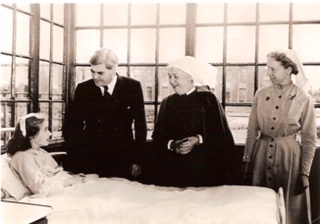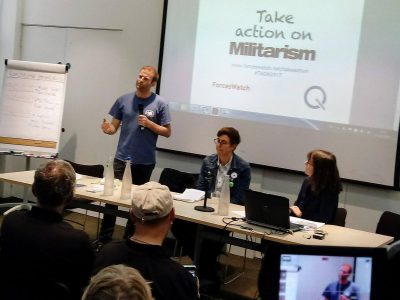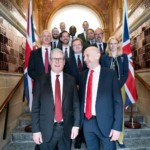Not just waving poppies, but drowning thought
Ekklesia
“There may well be a boom in poppy sales, but the act of Remembrance itself has been cheapened by a failure to back up words with action, particularly when it comes to successive governments’ care for victims of war, but equally in terms of the appalling the lack of resources put into peacebuilding.”
Simon Barrow
When politicians rush to claim that something is ‘non-political’ (as has been happening around Remembrance Day over the past week or so), you know that some healthy suspicion and careful examination is due.
The unfortunate reality is that, at present, the national ceremonies in the UK that (rightly) show respect to those who have died in war are also drenched in militaristic assumptions and symbols – ones which it is hard to say have no political content or bias.
The Prime Minister has also recently stressed the association of red poppy wearing with tub-thumping “national pride”, as my colleague Jonathan Bartley pointed out in an interesting exchange about ‘the politics of poppies’ on BBC2’s Newnight (11/11/11 – see iPlayer) with Gordon Corrigan, author of Mud, Blood and Poppycock: Britain and the Great War (Cassell Military Paperbacks), a revisionary account of the First World War.
Questions about the rightness or wrongness of armed conflict, concerns about particular wars (like the recent ones prosecuted in the Middle East); attempts to highlight alternatives forms of conflict resolution; the need to remember enemies, civilians and objectors, as well as soldiers… these and many other serious issues are all-too-easily swept away as the media and politicians encourage a frenzy of ‘patriotic’ poppy waving, while objecting to any attempt to consider or reflect on different perspectives.
Nor are such concerns minority ones endorsed only by ‘the usual suspects’. In a ComRes public opinion poll commissioned by Ekklesia two years ago (http://www.ekklesia.co.uk/node/10558), an astonishing majority of those questioned favoured a broader form of Remembrance. In particular:
* 87 per cent of those surveys said that the deaths of those who fought against Britain should be marked alongside the British dead in remembrance ceremonies.
* 93 per cent said they believe that contrary to many existing traditions, civilians who died in war should also be remembered.
* 95 per cent said they think the main message of Remembrance Sunday should be one of peace.
This survey also set the tenor of our detailed report ‘Re-imagining Remembrance’ (http://www.ekklesia.co.uk/research/reimagining_remembrance), written by Kate Guthrie, which stresses the need for Remembrance Day to become more truthful and therefore more meaningful for the future.
The recasting of Remembrance, says the report, would include a painful but necessarily honest acknowledgement that some do indeed “die in vain”, an end to “selective remembering”, a positive stress on peacemaking, and consideration to making Armistice Day (which marks the end of a war) a bank holiday.
‘Re-imagining Remembrance’ followed the death of the ‘last Tommy’, Harry Patch from World War 1, who sadly described current patterns of Remembrance Day as “just show business”.
There may well be a boom in poppy sales, but the act of Remembrance itself has been cheapened by a failure to back up words with action, particularly when it comes to successive governments’ care for victims of war, but equally in terms of the appalling the lack of resources put into peacebuilding.
Ekklesia’s report also traces the development of Britain’s remembrance tradition and makes a series of proposals about how Remembrance Day might be updated and made more accessible. It includes reflection on the meaning and practice of ‘memory’, not least from a Christian theological standpoint.
As the world continues to be threatened by violence, war and terror, these questions – tough though they are – will not go away.
See more: remembrance,









